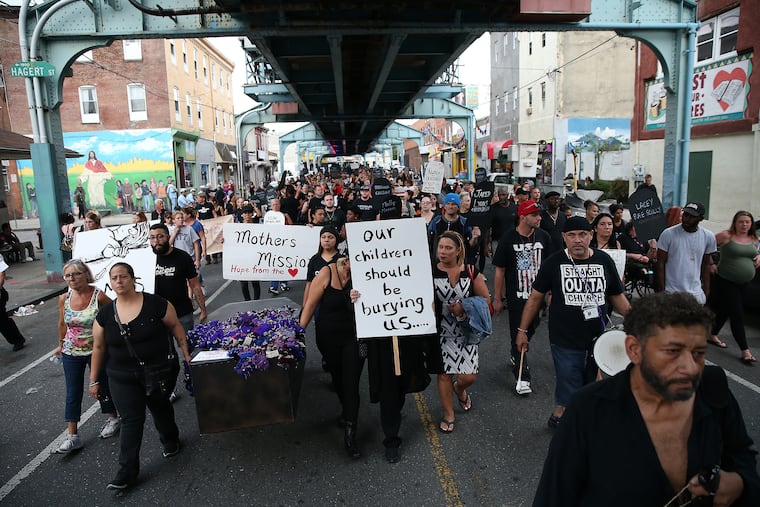Philadelphia’s weekend overdose spike kills 7, sickens more than 110
Seven people were killed and 110 were revived by police and paramedics in an unusual spike in overdoses around Philadelphia this weekend, with many victims displaying symptoms that doctors said were not typical of an opioid overdose. But the city-wide total is likely higher — perhaps closer to 200 — health officials said, once additional people who went to hospitals or were revived by friends are counted.

Seven people were killed and 110 were revived by police and paramedics in an unusual spike in overdoses around Philadelphia this weekend, with many victims displaying symptoms that doctors said were not typical of an opioid overdose. But the citywide total is likely higher — perhaps closer to 200, health officials said, once people who went to hospitals or were revived by friends are counted.
Health officials, who updated the figures several times, said they believe that the "bad batch" behind the overdose spike, centered around Kensington, was likely a combination of the same drugs that caused 165 overdoses and 10 deaths on a weekend in July. That deadly blend: a mix of heroin, fentanyl, and K2, a synthetic cannabinoid. Victims were agitated, hallucinating, and vomiting repeatedly.
"Overdose may not be the right term — it may be adverse reaction," said Tom Farley, the city's health commissioner. "People were responding to naloxone [the overdose-reversing drug], but when revived were combative, and some had repeated vomiting. That's not just from an opioid." Farley said his office is waiting for test results on the drugs suspected to be behind the overdoses.
Not all of the overdose victims were tied to the bad batch in Kensington. But, normally, police and paramedics would report from 30 to 60 overdose reversals around the city over a three-day span, compared with more than 100 from Friday through Sunday.
Joseph D'Orazio, the director of the division of medical toxicology in the emergency department at Temple University's Katz School of Medicine, said the emergency room at Temple's Episcopal Hospital, which handles most of Kensington's overdoses, is often so swamped with overdoses that patients must be diverted elsewhere.
Between Thursday and Sunday, Episcopal's ER saw 110 patients with drug-related complaints. Not all of the patients had taken the heroin-fentanyl-K2 combination, he said; still, over a typical four-day stretch, the hospital sees about 80 patients with drug-related issues.
On Friday, with 27 people overdosing that day, Allison Herens, the city's harm reduction coordinator, marshaled four other outreach workers to join her in Kensington as part of the city's new overdose-response protocol.
"Folks were violently vomiting, severely agitated, hallucinating," she said. "It can be much scarier than the kind of overdose you typically see. It's definitely a challenge — you don't have naloxone for K2," she said of the reversal medicine used to bring people out of an opioid overdose. "It seems everything is just getting all mixed together, which is just incredibly scary when you think about trying to respond and reduce harm."
John Fetterman, the Democratic candidate for lieutenant governor and a native of Western Pennsylvania, happened to be touring the neighborhood with local activists on Saturday, at the height of the overdose spike, when 62 people were sickened.
What he saw, Fetterman said Monday morning, shocked him. Braddock, the small Pittsburgh-area town where he is mayor, has been hit by addiction too, but the visibility of the crisis in Kensington was "a whole different level."
"Just the tragedy, and how pervasive it was," Fetterman said. "It's things that your average Pennsylvanian can't glean from reading an article about it. I've seen people in overdose — it's not uncommon, it's an issue in Western Pennsylvania, but not on the scale I saw that day."
He said he and his wife, Gisele, who were heading to a community cookout at an elementary school on Saturday, were struck by scenes that have become almost normal in Kensington: people in addiction asleep or unconscious on the sidewalks; people overdosing; people injecting drugs in the open.
"The image that will forever be in my mind," Gisele Fetterman said, "was a family with a child skipping through the chaos, and what that must be like to see that growing up, and how that becomes normal."
Several victims of last weekend's overdose cluster suffered serious complications, D'Orazio said — mostly because of the agitation caused by the drug combination.
"They'll swing at people, they'll injure other people as they're trying to get away, and they're clearly unaware of what they're doing," he said. "We had to sedate them. And if you require lots of medication to be sedated, you're not breathing so well, and some of those patients did end up in our hospital on ventilators."
Last weekend, he said, was frightening for doctors, first responders, and victims.
"I just spoke to a patient this morning who said that she intentionally used K2 once, and it was the worst thing ever, and she never wanted to use it again," D'Orazio said. "And clearly, she was exposed to it again without intending to be. It just goes to show that you never know what you're getting when you're buying a bag of heroin on the street."